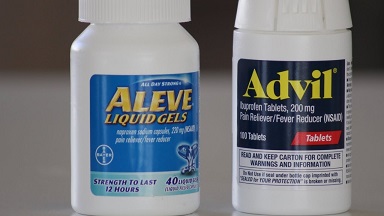Pharma News: University Of California Researchers Warns That NSAIDs Like Ibuprofen And Naproxen Actually Worsens Arthritis Inflammation!
Pharma News - Ibuprofen - Naproxen Nov 25, 2022 2 years, 4 months, 3 weeks, 4 days, 2 hours, 33 minutes ago
Pharma News: A new study lead by researchers from the Department of Radiology and Biomedical Imaging at the University of California, San Francisco- USA have found that the usage of pain relievers like Ibuprofen and Naproxen actually worsens arthritis inflammation.

The study team warns that the use of NSAIDS such as ibuprofen and naproxen might not have the desired effect patients are seeking when it comes to joint pain. In fact, the anti-inflammatory pain relievers may actually worsen inflammation in the long-term.
The new study findings to be published will be presented during the upcoming annual meeting of the Radiological Society of North America (RSNA) or RSNA 2022, later this month.
https://www.rsna.org/annual-meeting
Dr Johanna Luitjens, MD, a postdoctoral scholar in the Department of Radiology and Biomedical Imaging at the University of California, San Francisco who is also the lead author of the study along with her colleagues recently conducted an analysis of more than 1,000 patients to better understand whether the use of NSAIDs among patients with osteoarthritis had any long-term impact on their joint structure. They based the results of their study on findings visualized on MRI scans of the participants’ knees.
Dr Luitjens told reporters at the
Pharma News beat of Thailand Medical News, “NSAIDs are frequently used to treat pain, but it is still an open discussion of how NSAID use influences outcomes for osteoarthritis patients. In particular, the impact of NSAIDs on synovitis, or the inflammation of the membrane lining the joint, has never been analyzed using MRI-based structural biomarkers.”
It was reported that as the most common form of arthritis, osteoarthritis (OA) affects more than 32 million individuals in the U.S. and more than 500 million humans globally.
Typically, it occurs most frequently in the hands, hips, and knees. In individuals with osteoarthritis, the cartilage that cushions the joint gradually wears away. This is why it is sometimes called degenerative joint disease or “wear and tear” arthritis. Arthritis is often accompanied by inflammation, or swelling, of the joint, which can be painful.
Typically, non-steroidal anti-inflammatory drugs (NSAIDs) are commonly prescribed for osteoarthritis pain and inflammation. Common NSAIDs include Ibuprofen (Advil, Motrin) and Naproxen (Aleve). However, little is known about the long-term effects of these drugs on disease progression.
Dr Luitjens, added, “To date, no curative therapy has been approved to cure or reduce the progression of knee osteoarthritis.”
The study team set out to analyze the association between NSAID use and synovitis in patients with osteoarthritis of the knee and to assess how treatment with NSAIDs affects joint structure over time.
Dr Luitjens said, “Synovitis mediates development and progression of osteoarthritis and may be a therapeutic target. Therefore, the goal of our stud
y was to analyze whether NSAID treatment influences the development or progression of synovitis and to investigate whether cartilage imaging biomarkers, which reflect changes in osteoarthritis, are impacted by NSAID treatment.”
A total of 277 participants from the Osteoarthritis Initiative cohort with moderate to severe osteoarthritis and sustained NSAID treatment for at least one year between baseline and four-year follow-up were included in the study.
They were compared with a group of 793 control participants who were not treated with NSAIDs.
All study participants underwent 3T MRI of the knee initially and after four years. Images were scored for biomarkers of inflammation.
Upon reviewing the scans for inflammatory biomarkers, such as cartilage thickness, composition and other MRI measurements, the study team were unable to find any evidence that long-term NSAID use was beneficial in reducing inflammation of the knee joint.
On the contrary, the study team found that the opposite was true - that the group of patients with sustained NSAID use actually exhibited worse joint inflammation and cartilage quality in comparison to the control group on both baseline and follow-up imaging.
The study findings showed no long-term benefit of NSAID use. Joint inflammation and cartilage quality were worse at baseline in the participants taking NSAIDs, compared to the control group, and worsened at four-year follow-up.
Dr Luitjens further added, “In this large group of study participants, we were able to show that there were no protective mechanisms from NSAIDs in reducing inflammation or slowing down the progression of osteoarthritis of the knee joints. The use of NSAIDs for their anti-inflammatory function has been frequently propagated in patients with osteoarthritis in recent years and should be revisited, since a positive impact on joint inflammation could not be demonstrated.”
The stud team said that there are several possible reasons why NSAID use increases synovitis.
The study team commented, “On the one hand, the anti-inflammatory effect that normally comes from NSAIDs may not effectively prevent synovitis, with progressive degenerative change resulting in worsening of synovitis over time. On the other hand, patients who have synovitis and are taking pain-relieving medications may be physically more active due to pain relief, which could potentially lead to worsening of synovitis, although we adjusted for physical activity in our model.”
The study team stressed that prospective, randomized studies should be performed in the future to provide conclusive evidence of the anti-inflammatory impact of NSAIDs.
Recent studies have also showed that use of NSAIDs use have been linked to acute kidney injury and other kidney issues.
https://www.ncbi.nlm.nih.gov/pmc/articles/PMC6534025/
https://www.frontiersin.org/articles/10.3389/fphar.2021.750108/full
https://pubmed.ncbi.nlm.nih.gov/35534373/
https://journalrip.com/Article/jrip-20708
For the latest
Pharma News, keep on logging to Thailand Medical News.
